Thursday, March 2nd 2017

AMD's Ryzen Debut: Onwards to the HEDT Market or The Stumbling Hype Train
I should break down the bad news first: we here at TechPowerUp won't be able to provide you with a timely, straight-from-the-oven Ryzen review. Like some other publications, our Ryzen review sample failed to arrive on time. And trust us - we did will it to do so as much as we could, risking a Stranger-Things-esque nosebleed. Alas, to no avail.
The good news is that while we won't be able to offer you our own review of AMD and Jim Kellers' latest high-performance x86 brainchild, we will still strive to bring you meaningful coverage on it. This article aims to make an overall aggregation on review consensus, benchmarks and capabilities of the newest AMD CPU. Trying to add something, we'll also try and evaluate whether AMD learned - or didn't learn - something from its Bulldozer launch fiasco, in a pure marketing perspective. This will justify the editorialized nature of this article, but only after we dive straight to the numbers. Without further ado, follow on to the numbers.Multimedia, Encoding, Scientific
Reviews show consensus in that Ryzen is a powerhouse of a processor when it comes to multimedia and encoding workloads, mostly crushing Intel's competition - even in comparisons between chips with an identical number of cores. We've taken results from AnandTech, Tom's Hardware, Techspot, and Ars Technica, so as to be able to show you what different publications achieved with their Ryzen samples.The results really do speak from themselves: AMD's Ryzen are beastly workstation CPUs, pulverizing any competition that Intel has to offer purely in price/performance ratio - and yes, what you see up there is a $499, 95W Ryzen 7 1800X offering more than double the price/performance ratio of Intel's $1089, 140 W i7 6900K. What this represents is AMD's best-case scenario of optimization and performance, and here you can see where all the hype landed: AMD's ZEN architecture posting amazing single-threaded scores in Cinebench against all Intel processors that are even remotely clocked at the same levels. AMD seemingly has the best architecture for these kinds of workloads. Office, scientific, multimedia and encoding workloads seem to be the best fit for AMD's Ryzen, with reviewers far and wide praising the performance and power consumption in these scenarios. AMD truly delivered on the hype train, at least on this side of the equation.
While their chip may not be the fastest in every single benchmark, once you take into account some measure of pricing/performance considerations, Intel's solutions fall flat. The Ryzen 7 1800X absolutely trounces - and I mean, trounces - Intel's i7-6900K and i7-6950X in any performance/watt scenarios, which has typically been a hard playground for AMD. AMD's Ryzen is nothing short of a miracle for AMD in performance/watt terms, and is a culmination of the hype train AMD so thoroughly rode. AMD's Ryzen debut challenges even Kaby Lake in the per-core/power equation, something most of us never dreamed of seeing before. This, backed by AMD's almost revolutionary jump in IPC and single-thread performance, really is a chip to end all others, such as it stands.
Another point to consider is that AMD's Ryzen platform does all of this with measly dual-channel memory, and still goes on to beat Intel's HEDT designs which feature quad-channel memory. This really does go on to show how Intel's approach to the market and its processor and platform design has been clouded in smoke and mirrors, with no real performance advantages to be derived from them.
Gaming
Gaming, however, is another story. If you're looking for the best performer, bar none, for gaming, and have no other use for your PC's beating heart, the Core i7-7700K still remains your best performance bet, due to its inherently strong architecture and freak core-clocks. While AMD doesn't in any way steal the gaming crown from Intel, they did a damn good job at getting back on the gamer's radar. Ryzen is, above all, a competent performer, and a far cry from AMD's defunct Bulldozer and derivatives.Overall, AMD's solutions are slower than their Intel counterparts in pure FPS terms. Sometimes, the actual difference, while favoring Intel's CPUs, is negligible in pure fluidity terms; in others, the difference is markedly in Intel's favor. However, we can be looking at some bugs and needed optimizations on Ryzen's microcode and software updates for gaming and applications. AMD is fast to claim that it's working with software developers to patch and improve Ryzen support, claiming that its architecture is different enough to warrant some performance outliers. If one looks towards gaming at higher resolutions and with all eye-candy turned up to 11, however, like most of us like to play, suddenly the differences between chips seem to be minimal. Furthermore, AMD has recognized that its gaming performance needs improving, and says it expects "higher performance to occur throughout Q1 and Q2" as it works with developers and engine-makers to get Ryzen up to snuff. Oxide Games' Brad Wardell, for one, mentioned that Ashes of the Singularity currently isn't optimized for Ryzen, and promised future updates would increase performance.
Other things seem to point to some underlying issues: some games show better performance with AMD's SMT disabled. AMD also says that Window's power profiles may adversely affect performance, recommending the SO's High Performance Profile. Also, some games show higher performance on Ryzen with their DX12 code-paths (Hitman), while others show lower performance with it (Rise of the Tomb Raider.) AMD also suggest disabling the HPET (High Precision Event Timer), either in the BIOS or operating system, to gain a 5-8% advantage. AMD has also reportedly informed technology partners about the need to improve microcode on Ryzen in regards to memory performance, which could be negatively affecting performance. AMD has apparently ut all of its available microcode optimizations in time for launch on the CPU cores side of the equation, somewhat leaving memory throughput, performance and latency a little on the green side. This could very well be part of the reason why the Ryzen processors don't fare so well under gaming environments.
Review consensus: AMD's Ryzen chips are promising, but are mostly - and at least for now - superseded by Intel's quad-core i7-7700K (as are most processors in Intel's line-up, for that matter), in pure gaming terms. If gaming is your primary concern, the best performing one is still the i7-7700K. This is surely disappointing from a hype-train perspective. And even if one can call AMD's Ryzen processors disappointing in gaming terms, one can also surely call Intel's chips disappointing in multimedia and encoding tasks after seeing Ryzen's debut. It's a shame, considering all the fuss about low-level APIs, DirectX 12, and all the uttered advantages of the PS4 and XBOX One multi-core CPU approaches that some more improvements still haven't been done in regards to multi-threading capability and core scalability in gaming. A last note goes to AMD's improvement over its defunct Bulldozer architecture: the improvements are such that it starts looking ridiculous.
One other thing some reviewers touched upon was gaming fluidity. Whereas Intel's i7-7700K may often post the best results in pure FPS terms, some reviewers pointed towards a prevalence of dropped frames on Intel's processor - slight hiccups in gaming that mar the otherwise stellar experience. Apparently, AMD's Ryzen 7 processors feature no such hiccups, beating Intel's i7-7700K in that regard. It is a case, it seems, of subjective experience carrying something unseen by FPS counters - to a certain degree.
Overclocking
Overclocking on Ryzen 7's chips seems to top out at 4.1 GHz (from its stock 3.6 GHz), with Techspot's Steven Walton achieving that clockspeed with a 1800X, with voltage on auto, which saw the motherboard boosting it to around 1.35v when under load. The 1700X chip, however, only managed to make 3.95GHz (from its stock 3.4 GHz). Other reviewers seemed to hit the same walls, at least on air-cooling. This seems to point to a degree of binning in the chip's allocation to either 1800X or 1700X, as would be expected, and seems to point towards a 500 MHz overclocking ceiling .
Paul Alcorn over at Tom's Hardware managed to achieve a Prime95-stable 4 GHz clock rate at 1.425V using Asus' Crosshair V Hero (with load-line calibration set to Auto), with the highest temperature being at 82°C during the stress test.
A slight note to AMD's Ryzen Master software, which the company debuted alongside its Ryzen processors, which allows you to tune a number of variables, such as the CPU's ratio multiplier, voltage, and memory speeds, from inside the operating system.The bottom line
AMD arguably did everything right in the build-up to its Ryzen launch, the company's premier new CPU architecture that's touted to finally make it a serious contender to Intel's domination of the high-performance x86 architecture. With an under-performing and seriously outgunned architecture design on its Bulldozer line of processors - which married brains and brawn in all the wrong places - AMD found itself on a downhill battle for market share. Coupled with an over-promising, over-reaching marketing campaign, the consensus from the enthusiast community was a deserved one for AMD: the company had blatantly lied with regards to its CPUs prowess and capabilities. Lofty performance claims were the bullet-ridden corpses of AMD's dreams, made to cover a single fact: Bulldozer wasn't good enough for its surrounding environment.
A multitude of variables contributed to this particular equation: the cost in time and resources to develop with a multi-threaded workload in mind; the fact that the vast majority of consumers still carried either dual-core or quad-core systems; and Intel's own stance on the processor market, leveraging its indubitably better CPU architecture towards a steady stream of quantifiable yet unremarkable improvements over the years... Whilst keeping core-count increases away from the mainstream market through wallet-murdering pricing. Coupled with a slower than expected transition to GPU-leveraged computing tasks meant AMD's Bulldozer was ill-suited for the workloads that actually existed, much to the chagrin of many customers: that the 4-module, 8-thread 3.6GHz FX-8150 (Zambezi) generally (yet not always) led the 3.3GHz 6-core, 6-thread Phenom II X6 1100T (Thuban) K10 - but generally fell flat, performance-wise, of the 3.3GHz 4-core, 4-thread Core i5-2500 (Sandy Bridge). Lofty performance goals were cried from terraces, but when plied with scrutiny... Failed to keep in balance.
AMD's vision for Bulldozer hinged on the belief for fastly-developing multi-threaded workloads and the precipitous offload of floating point workloads to GPUs. This belief stemmed from AMD's much vaunted, then downplayed, Fusion strategy: the integration of CPU cores and GPU cores into accelerated processing units (APUs) so that mathematical tasks can use the GPU cores. Bulldozer was supposed to usher in a multi-threaded, GPU compute accelerated world. Thus, the problem with Bulldozer stemmed partly from an excessive confidence in the computing and software ecosystems. But it also has to be said that AMD maybe sacrificed too much, too soon, in regards to its generally strong K10 architecture in the pursuit of higher parallelization. The software of those days benefited from strong single-threaded performance. And until now, not much has changed (as Bulldozer's iterations can attest), and most likely won't change. Intel's decade-long approach - to have fewer, wider cores, and extract higher parallelism through the usage of Hyper-Threading - is now AMD's own as well.
Cue the Ryzen launch, and it would almost seem to be mirroring AMD's Bulldozer claims: lofty 40% improvement over the previous architecture claims were met with lukewarm enthusiasm and mild distrust from general consumers, enthusiasts and tech industry experts alike. That a company worth many times less than Intel, with a fraction of it's R&D budget, and which bled money for years, tearing itself apart with spin-offs, sales and lease-back of their own infrastructures could manage to achieve that kind of a performance uptick was a hard pill to swallow. And even so -that would hardly make it competitive with Intel's products. Follow the trickle of leaks and performance hints grew to instill confidence and enthusiasm in the x86 landscape as few times before it.
Ryzen is a return to form by AMD: a simultaneous return to the fold of the slowly-advancing ecosystem, with strong single-thread performance (right up within Intel's range), amazing multi-thread performance, and a level playing field with Intel through the use of SMT; and a look ahead at the future, with the company firmly planting its roots on a higher core-count approach without sacrificing single-threaded performance. It's one of those rare cases of having your cake and eating it too: AMD's Ryzen debut is a serious shakedown of the high-performance x86 market, having prompted various responses from Intel even before the chips were in consumers' hands. With Ryzen being what it is, and costing what it does, AMD will be stoking the furnaces at Intel for some much-delayed innovation and advancements - even if simply in core-count terms. AMD is by no means a saint, but in this case, this is most likely a turning point in the entire x86 hardware and software ecosystem - prompting a race for the pursuit of no holds-barred, increasingly-higher performance and core counts. That AMD's Ryzen is a tad disappointing in gaming terms has a measure of truth - though those differences seem to fade in high-settings, full-blown graphical presentations. But that AMD's Ryzen is a market-bending force in the multimedia, encoding and scientific workloads is a fact unto itself. And if you throw price-performance considerations into the mix, AMD's Ryzen is close to the second coming of the high-performance x86 market. It's not perfect. But it's definitely great.
AMD's toils resulted in Ryzen. A new horizon in the high-performance computing segment. And now, the ball is firmly in Intel's court, and I for one am eagerly expecting the blue giant's move.
Late edit: A last note goes to the fact that AMD's stock fell by 5.3% during the first two hours of Ryzen's launch. However, the trend has already reversed. As always, when a given product fails to hit all of the impossible marks set upon it by a hype train, Wall Street knee-jerks. However, I would say that the overturning that has already happened is here to stay, and will continue climbing to somewhere closer to AMD's pre-Ryzen-launch levels. Ryzen is a great chip, and has the potential to completely turn things around in the workstation and server market if its execution goes as planned, and even its gaming performance is subject to some measure of improvement in the coming months. AMD managed to deliver an incredible architecture from a very tight spot. Everyone will be able to see that, in time. But now, we're all still reeling from some measure of broken dreams and impossible expectations.
Sources:
Techspot, Tom's Hardware, AnandTech, ArsTechnica
The good news is that while we won't be able to offer you our own review of AMD and Jim Kellers' latest high-performance x86 brainchild, we will still strive to bring you meaningful coverage on it. This article aims to make an overall aggregation on review consensus, benchmarks and capabilities of the newest AMD CPU. Trying to add something, we'll also try and evaluate whether AMD learned - or didn't learn - something from its Bulldozer launch fiasco, in a pure marketing perspective. This will justify the editorialized nature of this article, but only after we dive straight to the numbers. Without further ado, follow on to the numbers.Multimedia, Encoding, Scientific
Reviews show consensus in that Ryzen is a powerhouse of a processor when it comes to multimedia and encoding workloads, mostly crushing Intel's competition - even in comparisons between chips with an identical number of cores. We've taken results from AnandTech, Tom's Hardware, Techspot, and Ars Technica, so as to be able to show you what different publications achieved with their Ryzen samples.The results really do speak from themselves: AMD's Ryzen are beastly workstation CPUs, pulverizing any competition that Intel has to offer purely in price/performance ratio - and yes, what you see up there is a $499, 95W Ryzen 7 1800X offering more than double the price/performance ratio of Intel's $1089, 140 W i7 6900K. What this represents is AMD's best-case scenario of optimization and performance, and here you can see where all the hype landed: AMD's ZEN architecture posting amazing single-threaded scores in Cinebench against all Intel processors that are even remotely clocked at the same levels. AMD seemingly has the best architecture for these kinds of workloads. Office, scientific, multimedia and encoding workloads seem to be the best fit for AMD's Ryzen, with reviewers far and wide praising the performance and power consumption in these scenarios. AMD truly delivered on the hype train, at least on this side of the equation.
While their chip may not be the fastest in every single benchmark, once you take into account some measure of pricing/performance considerations, Intel's solutions fall flat. The Ryzen 7 1800X absolutely trounces - and I mean, trounces - Intel's i7-6900K and i7-6950X in any performance/watt scenarios, which has typically been a hard playground for AMD. AMD's Ryzen is nothing short of a miracle for AMD in performance/watt terms, and is a culmination of the hype train AMD so thoroughly rode. AMD's Ryzen debut challenges even Kaby Lake in the per-core/power equation, something most of us never dreamed of seeing before. This, backed by AMD's almost revolutionary jump in IPC and single-thread performance, really is a chip to end all others, such as it stands.
Another point to consider is that AMD's Ryzen platform does all of this with measly dual-channel memory, and still goes on to beat Intel's HEDT designs which feature quad-channel memory. This really does go on to show how Intel's approach to the market and its processor and platform design has been clouded in smoke and mirrors, with no real performance advantages to be derived from them.
Gaming
Gaming, however, is another story. If you're looking for the best performer, bar none, for gaming, and have no other use for your PC's beating heart, the Core i7-7700K still remains your best performance bet, due to its inherently strong architecture and freak core-clocks. While AMD doesn't in any way steal the gaming crown from Intel, they did a damn good job at getting back on the gamer's radar. Ryzen is, above all, a competent performer, and a far cry from AMD's defunct Bulldozer and derivatives.Overall, AMD's solutions are slower than their Intel counterparts in pure FPS terms. Sometimes, the actual difference, while favoring Intel's CPUs, is negligible in pure fluidity terms; in others, the difference is markedly in Intel's favor. However, we can be looking at some bugs and needed optimizations on Ryzen's microcode and software updates for gaming and applications. AMD is fast to claim that it's working with software developers to patch and improve Ryzen support, claiming that its architecture is different enough to warrant some performance outliers. If one looks towards gaming at higher resolutions and with all eye-candy turned up to 11, however, like most of us like to play, suddenly the differences between chips seem to be minimal. Furthermore, AMD has recognized that its gaming performance needs improving, and says it expects "higher performance to occur throughout Q1 and Q2" as it works with developers and engine-makers to get Ryzen up to snuff. Oxide Games' Brad Wardell, for one, mentioned that Ashes of the Singularity currently isn't optimized for Ryzen, and promised future updates would increase performance.
Other things seem to point to some underlying issues: some games show better performance with AMD's SMT disabled. AMD also says that Window's power profiles may adversely affect performance, recommending the SO's High Performance Profile. Also, some games show higher performance on Ryzen with their DX12 code-paths (Hitman), while others show lower performance with it (Rise of the Tomb Raider.) AMD also suggest disabling the HPET (High Precision Event Timer), either in the BIOS or operating system, to gain a 5-8% advantage. AMD has also reportedly informed technology partners about the need to improve microcode on Ryzen in regards to memory performance, which could be negatively affecting performance. AMD has apparently ut all of its available microcode optimizations in time for launch on the CPU cores side of the equation, somewhat leaving memory throughput, performance and latency a little on the green side. This could very well be part of the reason why the Ryzen processors don't fare so well under gaming environments.
Review consensus: AMD's Ryzen chips are promising, but are mostly - and at least for now - superseded by Intel's quad-core i7-7700K (as are most processors in Intel's line-up, for that matter), in pure gaming terms. If gaming is your primary concern, the best performing one is still the i7-7700K. This is surely disappointing from a hype-train perspective. And even if one can call AMD's Ryzen processors disappointing in gaming terms, one can also surely call Intel's chips disappointing in multimedia and encoding tasks after seeing Ryzen's debut. It's a shame, considering all the fuss about low-level APIs, DirectX 12, and all the uttered advantages of the PS4 and XBOX One multi-core CPU approaches that some more improvements still haven't been done in regards to multi-threading capability and core scalability in gaming. A last note goes to AMD's improvement over its defunct Bulldozer architecture: the improvements are such that it starts looking ridiculous.
One other thing some reviewers touched upon was gaming fluidity. Whereas Intel's i7-7700K may often post the best results in pure FPS terms, some reviewers pointed towards a prevalence of dropped frames on Intel's processor - slight hiccups in gaming that mar the otherwise stellar experience. Apparently, AMD's Ryzen 7 processors feature no such hiccups, beating Intel's i7-7700K in that regard. It is a case, it seems, of subjective experience carrying something unseen by FPS counters - to a certain degree.
Overclocking
Overclocking on Ryzen 7's chips seems to top out at 4.1 GHz (from its stock 3.6 GHz), with Techspot's Steven Walton achieving that clockspeed with a 1800X, with voltage on auto, which saw the motherboard boosting it to around 1.35v when under load. The 1700X chip, however, only managed to make 3.95GHz (from its stock 3.4 GHz). Other reviewers seemed to hit the same walls, at least on air-cooling. This seems to point to a degree of binning in the chip's allocation to either 1800X or 1700X, as would be expected, and seems to point towards a 500 MHz overclocking ceiling .
Paul Alcorn over at Tom's Hardware managed to achieve a Prime95-stable 4 GHz clock rate at 1.425V using Asus' Crosshair V Hero (with load-line calibration set to Auto), with the highest temperature being at 82°C during the stress test.
A slight note to AMD's Ryzen Master software, which the company debuted alongside its Ryzen processors, which allows you to tune a number of variables, such as the CPU's ratio multiplier, voltage, and memory speeds, from inside the operating system.The bottom line
AMD arguably did everything right in the build-up to its Ryzen launch, the company's premier new CPU architecture that's touted to finally make it a serious contender to Intel's domination of the high-performance x86 architecture. With an under-performing and seriously outgunned architecture design on its Bulldozer line of processors - which married brains and brawn in all the wrong places - AMD found itself on a downhill battle for market share. Coupled with an over-promising, over-reaching marketing campaign, the consensus from the enthusiast community was a deserved one for AMD: the company had blatantly lied with regards to its CPUs prowess and capabilities. Lofty performance claims were the bullet-ridden corpses of AMD's dreams, made to cover a single fact: Bulldozer wasn't good enough for its surrounding environment.
A multitude of variables contributed to this particular equation: the cost in time and resources to develop with a multi-threaded workload in mind; the fact that the vast majority of consumers still carried either dual-core or quad-core systems; and Intel's own stance on the processor market, leveraging its indubitably better CPU architecture towards a steady stream of quantifiable yet unremarkable improvements over the years... Whilst keeping core-count increases away from the mainstream market through wallet-murdering pricing. Coupled with a slower than expected transition to GPU-leveraged computing tasks meant AMD's Bulldozer was ill-suited for the workloads that actually existed, much to the chagrin of many customers: that the 4-module, 8-thread 3.6GHz FX-8150 (Zambezi) generally (yet not always) led the 3.3GHz 6-core, 6-thread Phenom II X6 1100T (Thuban) K10 - but generally fell flat, performance-wise, of the 3.3GHz 4-core, 4-thread Core i5-2500 (Sandy Bridge). Lofty performance goals were cried from terraces, but when plied with scrutiny... Failed to keep in balance.
AMD's vision for Bulldozer hinged on the belief for fastly-developing multi-threaded workloads and the precipitous offload of floating point workloads to GPUs. This belief stemmed from AMD's much vaunted, then downplayed, Fusion strategy: the integration of CPU cores and GPU cores into accelerated processing units (APUs) so that mathematical tasks can use the GPU cores. Bulldozer was supposed to usher in a multi-threaded, GPU compute accelerated world. Thus, the problem with Bulldozer stemmed partly from an excessive confidence in the computing and software ecosystems. But it also has to be said that AMD maybe sacrificed too much, too soon, in regards to its generally strong K10 architecture in the pursuit of higher parallelization. The software of those days benefited from strong single-threaded performance. And until now, not much has changed (as Bulldozer's iterations can attest), and most likely won't change. Intel's decade-long approach - to have fewer, wider cores, and extract higher parallelism through the usage of Hyper-Threading - is now AMD's own as well.
Cue the Ryzen launch, and it would almost seem to be mirroring AMD's Bulldozer claims: lofty 40% improvement over the previous architecture claims were met with lukewarm enthusiasm and mild distrust from general consumers, enthusiasts and tech industry experts alike. That a company worth many times less than Intel, with a fraction of it's R&D budget, and which bled money for years, tearing itself apart with spin-offs, sales and lease-back of their own infrastructures could manage to achieve that kind of a performance uptick was a hard pill to swallow. And even so -that would hardly make it competitive with Intel's products. Follow the trickle of leaks and performance hints grew to instill confidence and enthusiasm in the x86 landscape as few times before it.
Ryzen is a return to form by AMD: a simultaneous return to the fold of the slowly-advancing ecosystem, with strong single-thread performance (right up within Intel's range), amazing multi-thread performance, and a level playing field with Intel through the use of SMT; and a look ahead at the future, with the company firmly planting its roots on a higher core-count approach without sacrificing single-threaded performance. It's one of those rare cases of having your cake and eating it too: AMD's Ryzen debut is a serious shakedown of the high-performance x86 market, having prompted various responses from Intel even before the chips were in consumers' hands. With Ryzen being what it is, and costing what it does, AMD will be stoking the furnaces at Intel for some much-delayed innovation and advancements - even if simply in core-count terms. AMD is by no means a saint, but in this case, this is most likely a turning point in the entire x86 hardware and software ecosystem - prompting a race for the pursuit of no holds-barred, increasingly-higher performance and core counts. That AMD's Ryzen is a tad disappointing in gaming terms has a measure of truth - though those differences seem to fade in high-settings, full-blown graphical presentations. But that AMD's Ryzen is a market-bending force in the multimedia, encoding and scientific workloads is a fact unto itself. And if you throw price-performance considerations into the mix, AMD's Ryzen is close to the second coming of the high-performance x86 market. It's not perfect. But it's definitely great.
AMD's toils resulted in Ryzen. A new horizon in the high-performance computing segment. And now, the ball is firmly in Intel's court, and I for one am eagerly expecting the blue giant's move.
Late edit: A last note goes to the fact that AMD's stock fell by 5.3% during the first two hours of Ryzen's launch. However, the trend has already reversed. As always, when a given product fails to hit all of the impossible marks set upon it by a hype train, Wall Street knee-jerks. However, I would say that the overturning that has already happened is here to stay, and will continue climbing to somewhere closer to AMD's pre-Ryzen-launch levels. Ryzen is a great chip, and has the potential to completely turn things around in the workstation and server market if its execution goes as planned, and even its gaming performance is subject to some measure of improvement in the coming months. AMD managed to deliver an incredible architecture from a very tight spot. Everyone will be able to see that, in time. But now, we're all still reeling from some measure of broken dreams and impossible expectations.
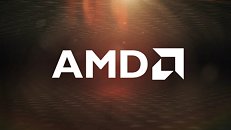

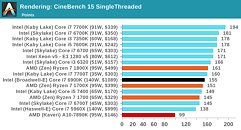
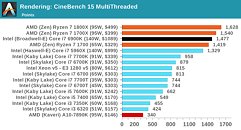
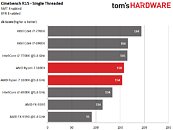
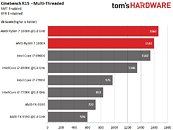
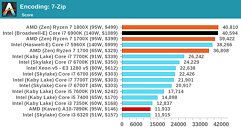
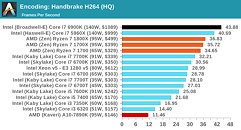
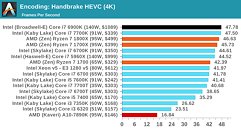
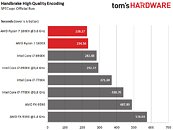
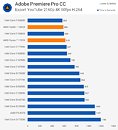
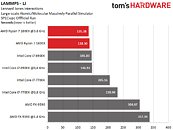
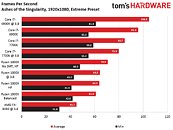
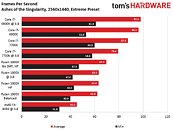
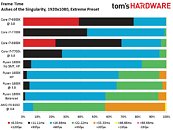
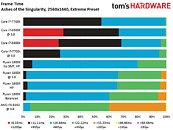
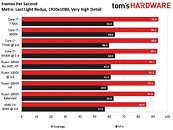
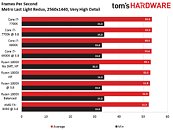

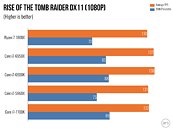
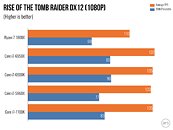
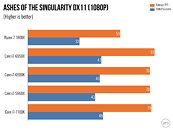
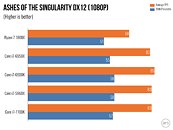
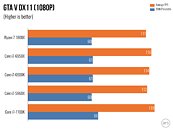
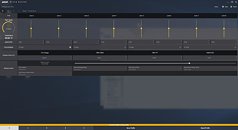
160 Comments on AMD's Ryzen Debut: Onwards to the HEDT Market or The Stumbling Hype Train
If anyone had hopes that this thing would be better than it is ... they deserve to be perpetually dissapointed in every fathomable way, and they have no businness even approximating a tangent to happiness and surprise, the greatest of affections.
The temps could just be the different sensors reporting differently so we can't really read much into that. Total power use at the wall for the system (with identical PSUs) would be of more relevance I think.
Add in cooler problems, memory issues, BIOS issues; all of which are on AMD and not the board makers; and yeah, Ryzen feels rushed and disappointing. That's after I have had a chance to play with one for a couple of days. Do keep in mind, I was not given the CPU to do a CPU review; I was given it so I could do board reviews. I'll do that, of course, but it is hard to be excited about a platform that carries so many issues right now, and issues that rely on AMD to fix.
So here, we have the opinion of someone who has a chip, and doesn't like it, and someone who doesn't have one, who does like it. Meh. :p
Yes, it can zip files faster and ray trace faster. Something I do once a year.
Best outcome of this Ryzen situation is to keep AMD in business and for Intel stops wasting half the die area for a useless GPU and puts CPU cores instead :-)
That said, yes, potential is there for sure.
It's not just BIOS quality, it's how you have to flash BIOSes that is a pain. If you don't have a FAT32 USB stick and want a Ryzen system, you best add one to your shopping list, because you won't be able to flash BIOS without it. That's a minor issue, but makes it feel like 2001 all over again. Problem is, it's 2017...
Let's also not forget, AMD designed ZEN all while Restructuring the company and continuing to fund its CPU division by modest Bulldozer enhancements. AMD Achieved the impossible. Major Congrat's to them. And to there CPU Team.
Intel CPU Gen has been in the market now for ages. They are all OPTIMIZED for most if not all AAA Games.
Ryzen has done amazing so far, and for a chip that is not optimized. Yet some want to throw it under the bus. Where the heck is the Logic in that?
They need X370 refinements, bios updates, optimized codes etc., Get over it people, Ryzen is a WIN WIN. Hands Down.
last time we saw that from intel was 775-1156 (or 1366-2011)
In that respect its a win.
In terms of gaming performance clock for clock performance seems okay but not ground breaking if the 4 core 8 thread models come with much higher boost clocks then they could be competitive with Intel.
Although I sincerely doubt that they will be able to boost beyond or overclock beyond 4.5 with 1st generation Silicone.
As someone who does a bit of everything on my computer though Ryzen 7 looks like a good option.
Hopefully clevo make a laptop with a 1800x inside or what ever the current equivalent will be by the time I get round to making a purchase.
Reading the gaming performance is soso and looking at the prices I feel a bit stumped tbh. What is amd thinking?
I will wait for reviews from real testers thank you!
AMD didn't hype anything outside multi-core and the game comparisons to 7700k were in the form of Video gaming + Streaming.
If anyone is at fault really is TPU for falling victim to its own "Rumor, click bait" blitz.
@Techspot full Review: www.techspot.com/review/1345-amd-ryzen-7-1800x-1700x/
Also it has been years since AMD has been a player in the CPU market. Everyone has fine tuned their apps and games for Intel and have been tweaking them for years and since Intel hasn't made any large leaps and changed their CPU's in any significant way no one has had to change much but instead just tweak them like crazy. AMD should get some boosts over time once we see code made for them.
It will be interesting to see if they will ship some really high clocked chips with some lower thread counts for gamers. At this point I have seen a lot of negative things said about Ryzen from the reviews for gaming against a 7700K well a 6900K gets beat pretty soundly as well by a 7700K in gaming because clockspeed is king.
Another thing to note is rumor is that Intel has been telling a lot of review sites to contact them before they write their Ryzen reviews. Seems kind of fishy as well so I can't wait to see individual users show their personal benchmarks and see how things play out.
I am so torn right now. Intel 7700K is the best option for me because I mostly game. But at the resolution and settings I play at, it looks like I will be hitting the GPU bottleneck before the CPU and it really isn't going to matter. I don't count the smoothness factor.
3200 MHz C14, no problem:
cdawall here on TPU also posted 3600 MHz screens.AMD gave samples to newbs. We all know why. ROFL :nutkick:
I for once will not be upgrading to Ryzen because my i5 6500 is more than enough for Gaming, besides games do not use more than 6 Threads and this will be the norm in the following two years. The real hype train in gaming in my opinion are the R3 and R5, but.... the frequency that AMD announced does seem quite lacking, In any case 8 Cores 16 Threads CPU's are aimed more at productivity than Gaming. I think R7 Lineup is quite Good since i always expected Zen IPC would match Haswell, and i knew very well that 8 Cores 16 Threads would have lower Clocks to keep TDP in Check. It was expected! The good news is that it forced Intel to lower their prices, which was a most needed thing.
AMD basically did what everyone wanted, which is to improve their IPC by 53% (Their Claim) and to sell it for much cheaper to intel similar Offerings, and people still Rage and Cry.
If AMD can do R5 with 6/8 Cores without SMT i'm Gold for Ryzen. As gamer i got little interest 16 threads + extra price, besides games will still be using 4-6 cores in the next two years. But AMD really really need to raise the Frequency for R3/R5 or it would look very underperforming in gaming compared to what Intel has to offer at this moment, let alone what ever comes up from Intel. even if Intel CPUs cost more people will choose them just because is a tad bit faster. It is what it is.
In any case, no wonder why TPU has not been getting Rewiew hardware from AMD... looking at TPU past reviews lol.
A lot of the other reviews I have seen have been similar with memory clocked at 2666. Not sure if it is the boards they got or what. Linus used an Asus ROG board I believe.
Higher memory clocks I think should help in benchmarks.
One thing i have noticed from those that have gotten all three chips is that most of those sites got at least 100hz more from the 1700 than they could from the 1700x which seems kind of interesting.
Be interesting to see how it plays out once we have a platform, games, and apps all optimized with a mature platform I expect things could look much better than they do today on launch day.